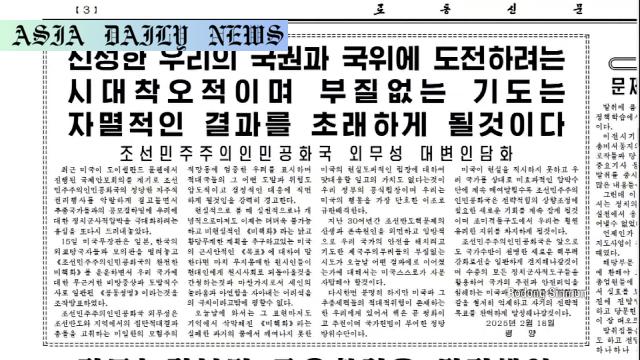Denuclearization efforts face challenges as North Korea emphasizes strengthening its nuclear force amidst regional tensions.
North Korea reaffirms commitment to strengthening its nuclear force.
US, Japan, and South Korea’s denuclearization efforts face resistance.
North Korea emphasizes nuclear weapons as a means of self-defense.

North Korea’s Commitment to Strengthening Nuclear Capabilities
North Korea recently reiterated its commitment to strengthening its nuclear force amidst ongoing regional and international concerns. A statement from the Ministry of Foreign Affairs, published in the state-run Rodong Sinmun newspaper, emphasized that nuclear weapons are crucial for defending the nation’s sovereignty and maintaining peace. This declaration underscores North Korea’s defiance against growing calls for denuclearization.
US, Japan, and South Korea’s Coordinated Denuclearization Efforts
On February 15, representatives from the United States, Japan, and South Korea confirmed their resolve to work together towards the complete denuclearization of North Korea. These coordinated efforts aim to address the nuclear threats posed by North Korea in the region and globally. However, Pyongyang’s recent statement appears to challenge these efforts, calling their goals “impossible and impracticable.”
North Korea’s Justification for Sustaining its Nuclear Arsenal
In its statement, North Korea justified its nuclear arsenal as a means of “legitimate self-defense” against perceived threats from the United States and its allies. The nation’s leadership views its nuclear capabilities as both a strategic deterrent and a constitutional mandate for ensuring sovereignty. This perspective solidifies its stance against denuclearization dialogues.
Expert Insights and Regional Implications
Experts in South Korea suggest that North Korea’s unwavering position may signal its insistence on being recognized as a nuclear power. This development complicates the geopolitical landscape, especially as US President Donald Trump hinted at a willingness to engage in dialogue with North Korean leader Kim Jong Un. Any negotiations will likely face significant barriers given these recent declarations.
Future Prospects for Denuclearization Talks
The road to denuclearization in North Korea remains fraught with challenges. With Pyongyang asserting its nuclear agenda, diplomatic efforts may require innovative approaches to bridge the growing divide. The global community must navigate the complexities of maintaining peace and fostering constructive communication with North Korea.
Conclusion
In conclusion, North Korea’s renewed commitment to strengthening its nuclear force highlights the challenges of achieving denuclearization in the region. It invites a multifaceted diplomatic effort by the international community to address this pressing issue effectively.
Commentary
Understanding North Korea’s Nuclear Position
North Korea’s recent emphasis on nuclear power raises significant concerns about the prospects for peace and stability in East Asia. While its leadership frames nuclear weapons as a means of ensuring sovereignty and peace, the global community views such advancements with apprehension. This duality complicates international relations and necessitates a nuanced approach to diplomacy.
The Role of International Diplomacy
Efforts by the United States, Japan, and South Korea to achieve denuclearization represent important steps in fostering regional stability. However, Pyongyang’s reluctance to engage in these discussions underscores the need for new strategies. Diplomats must find ways to address North Korea’s security concerns while simultaneously working towards the reduction of its nuclear arsenal.
Looking Ahead
As North Korea continues to assert its nuclear capabilities, the international community faces an uphill battle. It must balance pressure with dialogue, aiming to create an environment conducive to mutual trust and cooperation. While the path ahead is challenging, sustained efforts can pave the way for meaningful progress.


